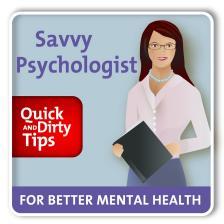Is My Job Stress Causing Burnout?
We’ve all had days where we feel like a salmon swimming upstream: we exert maximum effort, only to be swept back by forces beyond our control. To make matters worse, we all know what happens to the salmon at the end of that journey. But what if your entire job starts to feel like an ill-fated upriver struggle? This week, by request from listener Liz L. from Boston, Savvy Psychologist Dr. Ellen Hendriksen explains the three signs of burnout. Next week, we’ll cover how not to end up dead in the water.
Burnout has been around as long as there have been professions, but no one actually named it until psychologist Herbert Freudenberger coined the term and wrote the classic 1980 book Burnout: The High Cost of High Achievement.
At first, Freudenberger theorized only those in a helping profession—nurses, teachers, social workers (and, yes, psychologists)—were prone to burnout.
But over the last 30 years, jobs have intensified. Demands from clients, patients, or customers, not to mention the corner office, have increased, often without sufficient personnel, resources, or space to meet them.
In addition, organizations and employees are increasingly uncommitted to one another and each side is left trying to wring as much out of each other as possible.
For all of us who check work email in bed, it’s become increasingly obvious that anyone can get burned out, from students to stay-at-home-moms to hedge fund managers.
So what exactly is burnout? In the United States, burnout isn’t a diagnosis, though it is in Sweden and the Netherlands. Regardless, there are three core symptoms: emotional exhaustion, depersonalization, and reduced personal accomplishment.
So let’s walk through the triple threat of symptoms.
Symptom #1: Emotional Exhaustion
You feel empty, like something vital has been drained out of you. You feel unmotivated and perk up only when you fantasize about quitting in a dramatic fashion (“What if I just drove past my work and kept going?” “What if I stormed into my boss’s office and yelled “I quit!”). You dread going to work and count the minutes until you can leave.
And even though the symptom is called emotional exhaustion, there’s a heavy physical component as well: you’re always tired, no matter how much rest you get. It’s a chore to peel yourself out of bed on the mornings you go to work.
Symptom #2: Depersonalization
The idealism that once drove you has slowed to a trickle because it is too painful, too draining, or too unrewarding. In fact, that old idealism has morphed into cynicism. Humor has mutated into sarcasm.
The people you work for—students, patients, clients, or customers—seem like a parasitic burden; you used to feel for them, now you just resent them. You grow bitter and impatient. “No one appreciates what I do for them.” You feel like you’re not making a difference, so you start believing they’re not important anyway. You stop caring.
Symptom #3: Reduced Personal Accomplishment
Burnout not only takes a toll on your psyche, it takes a toll on your actual work performance. And even if you can fake it, it certainly takes a toll on your life. Concentration is difficult. You feel sluggish. And forget coming up with anything creative—you’re lucky just to check all your boxes, much less think outside them.
Next, how does burnout start? Researchers have found that something called effort-reward imbalance sets the stage for burnout, which, in short, is having to work really hard for little or no payoff.
In a 2010 study, the leading researcher on burnout, Dr. Christina Maslach (who, for psychology nerds out there, is married to Philip Zimbardo of the Stanford Prison Experiment fame) examined the effort-reward imbalance in more than 900 Las Vegas hotel room cleaners and, unsurprisingly, found that the greater the imbalance, the worse the cleaners’ physical and mental health.
It makes sense: work is the biggest activity of your life, so if you hate how you’re spending the majority of your time, your mind and body will let you know.
Next week, we’ll cover nine ways to cope with burnout. So tune in and learn how not to end up like our fishy friends.
For a good long read on burnout, this 2007 New York Magazine article is still spot on.
REFERENCES:
Maslach, C., Jackson, S.E., Leiter, M.P. (1996). MBI: The Maslach Burnout Inventory: Manual. Press CP, Palo Alto.
Maslach, C. (2011). Burnout and engagement in the workplace: New perspectives. European Health Psychologist, 13, 44-47.
Maslach, C., Schaufeli, W.B., & Leiter, M.P. (2001). Job burnout. Annual Review of Psychology, 52, 397-422.
Schaufeli, W. B., Leiter, M. P., & Maslach, C. (2009). Burnout: Thirty-five years of research and practice. Career Development International, 14, 204-220.
Krause, N., Rugulies, R. & Maslach, C. (2010). Effort-reward imbalance at work and self-rated health of Las Vegas hotel room cleaners. American Journal of Industrial Medicine, 53, 372-86.








